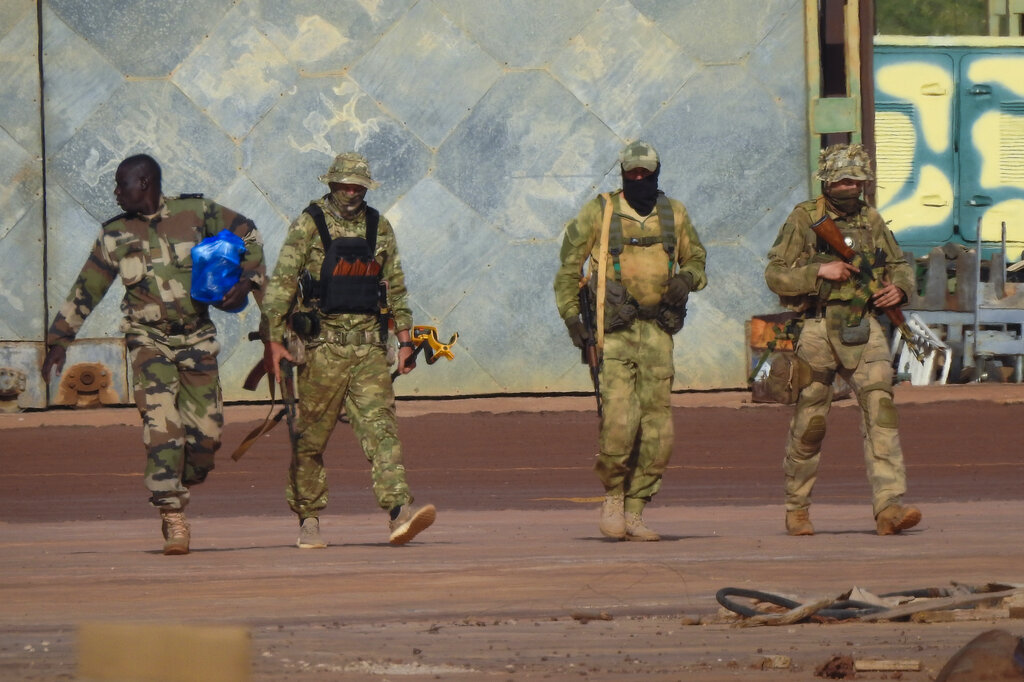Since arriving in Mali almost four years ago, Russia’s Wagner Group mercenaries have kidnapped, imprisoned and tortured hundreds of Malian civilians in conjunction with the country’s ruling junta. Some of those captured were held for ransom before being released to local police.
Many of those in the hands of Wagner are members of the Fulani community, which has been repeatedly targeted for attacks by Soldiers and mercenaries.
“Civilians have been deliberately targeted since Wagner’s arrival,” Yvan Guichaoua, a researcher at the Bonn International Centre for Conflict Studies, told investigators with the media group Forbidden Stories. “Security forces tend to view populations living in jihadist-influenced areas as collaborators.”
Mali’s ruling junta, led by Col. Assimi Goïta, overthrew the country’s democratic leadership in 2021, claiming the government was failing to end the yearslong rebellion by Tuareg groups in the north. Since then, the junta has struggled to restore security to the country. Goïta’s group expelled French forces and invited Wagner Group mercenaries into Mali to train its military. Wagner mercenaries quickly went from trainers to executing attacks on communities across the country, part of a pattern of human rights violations they have demonstrated in the Central African Republic, Libya and Syria.
“Bringing in the Russians has direct implications for how force is used,” Guichaoua said.
Wagner’s strategy in Mali included operating prisons at six military bases where captured civilians were held, beaten, and tortured — many of them innocent of any involvement with extremist groups.
“Most people die in detention,” Attaye Ag Mohamed Aboubacrine, deputy secretary general of the Kal Akal human rights group, told Forbidden Stories investigators.
Investigators interviewed Malians living at a displaced persons camp in Mbera, Mauritania, who had survived contact with Wagner forces between 2022 and 2024. Captives were held in prisons at military bases in Bapho, Kidal, Niafunké, Nampala, Sévaré and Sofara. Former United Nations bases have also been turned into prisons.
“The total number of active detention centers during Wagner’s mission in the country is likely much higher than the six prisons our consortium identified, as numerous experts informed us,” investigators wrote.
Wagner has held some prisoners in metal containers sitting fully exposed to the broiling sun.
“At night, it was pitch black. There were just a few holes for light. There was nothing but a board on the floor,” a 25-year-old tailor identified as Ismail told investigators. “There were up to 10 of us inside during my 40 days there.”
Ismail told investigators his captors beat him unconscious on his first day in their custody. He was later forced to load trucks and dig holes.
A Fulani shopkeeper identified as Nawma spent four days in Wagner custody at a prison in Nampala, where he was tied up naked in a shower and beaten in the head.
“I lost a lot of blood,” Nawma told investigators. “They also burned my stomach with a lighter.”
According to human rights advocate Boubacar Ould Hamadi, president of the Collective for the Defense of the Rights of the Azawad People, the abuses by the Malian Armed Forces and Wagner mercenaries are part of a strategy to drive people out of the target regions.
The collective recorded more than 300 kidnappings or disappearance in northern Mali between October 2024 and March 2025 alone. In some cases, Malians captured by Wagner mercenaries were held for ransom or turned over to Malian authorities for prosecution. That’s what happened to Mohamed, a Tuareg medical assistant who was captured along with eight others at a market in central Mali in December 2022.
After being questioned for two days about a man Malian Soldiers were hunting, Mohamed was handed over to the gendarmerie on fake charges. He was released after his family paid $2,600.
In recent weeks, the Wagner Group announced it was leaving Mali to be replaced by the Russian Defense Ministry’s Africa Corps, a group comprised largely of former Wagner Group fighters. Guichaoua said the Malian junta’s invitation to the Wagner Group — and now Africa Corps — is part of a broader strategy of using greater force and avoiding accountability.
“The Malians probably wanted to change the way they wage war and get rid of external scrutiny of their Army,” Guichaoua told Forbidden Stories. “Bringing in the Russians has direct implications for how force is used.”

